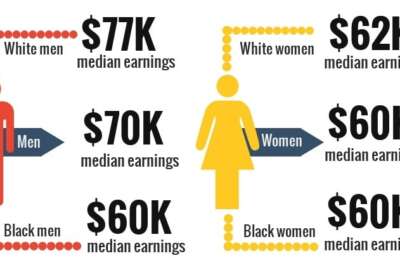

Shutdown's impact on contractors: It's not just the lack of new work that hurts. They're not being paid for work they've already done.
Whatever one might say about the complexity of the federal procurement system, it has at least one thing going for it: Once a contractor has navigated the vagaries of the Federal Acquisition Regulation and won an award, the government is extremely good at paying its bills on time.
Except, that is, during a government shutdown.
As the partial shutdown nears the end of its fifth week, it’s not just the inability to earn new awards or the stop-work orders that’s biting federal contractors. In many cases, they’re also not being paid for work they finished and invoiced long before the shutdown began. That’s largely because many of the staff at some of the government’s largest payment processing agencies have been furloughed.
The sudden crimping-off of revenue is especially harmful to small contractors, said David Berteau, the president of the Professional Services Council.
“We have companies that have invoices going back to October or November. They haven’t been paid, and they just don’t have the cash flow reserves to sustain that,” Berteau told reporters on a conference call Thursday afternoon. “The funds are there, because they’re prior-year appropriations. It’s a comedy of errors. The money is there, and the companies need to get paid or else they go out of business.”
According to an analysis of contracting data by the U.S. Chamber of Commerce, small businesses alone have foregone an estimated $2.3 billion in contracts they would have otherwise gotten from the agencies affected by the shutdown. The calculations examined 41,000 small firms who took in a total of $29 billion in federal contract revenue in 2018 from the agencies that are now shut down.
And even though there are no appropriations available to issue or pay for new contracts, to industry advocates, the problem of overdue invoices that were issued before Dec. 22 seems like a relatively straightforward one to fix.
The administration, they say, should permit large payment providers like USDA’s National Finance Center and the Treasury Department’s Bureau of the Fiscal Service to recall furloughed employees so they can begin working their way through past-due bills.


“The shutdown has a two-prong effect on this process,” said David Grant, a former associate administrator for FEMA’s Mission Support Bureau who’s now a partner at Potomac Ridge Consulting. “If an invoice has been approved and then the shutdown happened, agencies will not make the 30 day payment requirements. Second, there will be a backlog of invoices that need to be accepted and approved. Now you will have a bunch of invoices to process and the payment people also will have a backlog of things to get done as well because they also will have to get payroll out the door, as well as other things. That finance office will be swamped and they will not get it done timely.”
The Prompt Payment Act also requires the government to automatically tack on compounding interest penalties — currently set at 3.625 percent — when it pays its vendors late, plus additional penalties if it doesn’t pay the initial penalties promptly.
“There is no side budget or other funding to cover the interest payments,” Grant said. “It will have to come out of somewhere, some program funding.”
But the law also contains an enormous loophole.
Regardless of when a contractor submitted its invoice, the 30-day clock doesn’t actually start ticking until the government payment provider formally “accepts” that invoice. And vendors have learned from past shutdowns that simply delaying the acceptance process is one way for agencies to avoid the penalties altogether, Berteau said.
“They have found many reasons to indicate that, in fact, they hadn’t fully completed the acceptance of the invoice and therefore the prompt payment provisions do not apply,” he said. “Obviously that’s a discretionary decision on the part of the government, and it would be useful if there were guidance and if Congress indicated an interest in having the government to do a full application of the intent of the Prompt Payment Act. But in many cases, companies are going to be left holding the bag twice: First of all, they won’t get paid in a timely manner, and secondly, they won’t get the benefit of the [interest] if and when it happens.”
The shutdown has now dragged long enough that even some of the obligations federal agencies incurred to perform “excepted activities” during the initial days of the appropriations lapse have now technically crossed the 30-day mark.
Since no lapse has ever lasted this long, the question of whether the Prompt Payment Act could be used to prod the government into settling those sorts of bills has never been tested in court.
But Eric Montalvo, a partner at the Federal Practice Group, said he doubted the law could be used in that circumstance either to accelerate payments or demand interest charges.
“There’s no appropriated funds available. Therefore, even though they’re excepted and being forced to perform, the Congress has to come back afterward in order to account for that,” he said.
The long-term effects of the shutdown on industry remain to be seen, least of all because there’s still no clear end in sight. Although small firms are the ones least-able to weather the storm, even some of the government’s biggest contractors are also seeing significant effects.
SAIC, for example, said this week that it has $100 million in outstanding bills to shutdown-affected agencies.
And while firms that specialize in federal business are highly unlikely to stop doing so, industry advocates warn that companies that are less dependent on government contracts will view the shutdown as one more reason to avoid them.
“It used to be that if you were working for the government, that was a reliable partner,” said Neil Bradley, the executive vice president and chief policy officer at the U.S. Chamber of Commerce. “That that was one of the benefits of doing business with the government, maybe sometimes even different from the private sector: the low risk. This shutdown has managed to turn that absolutely on its head. Now folks have no real sense that they can rely on the government to be an appropriate partner that pays its bills on time and keeps the doors open. And this could have consequences for years or even decades to come.”
Citizant, a Chantilly, Va.-based small business whose contracts predominantly involve shutdown-affected agencies, said it has no intention of exiting the federal contracting space even though its cash flow has slowed to a trickle. It, too, has unpaid invoices dating back to November.
But the company’s CEO, Alba Alemán, said she was confident there would be an exodus of companies that have a more take-it-or-leave it stance toward government work, as happened following the 2013 government shutdown.
“If you look at the trends in the two years following the last shutdown, more companies were leaving the government marketplace than ever before, and the growth of government contractors did not begin anew for another one to two years after that,” she said. “Our folks happen to be very mission-focused and mission-oriented, so we choose to do the work that we do and we’re willing to make sacrifices. But there are companies with innovative tools, approaches, and skills that our government needs that will not want to do this ever again.”
Copyright © 2024 Federal News Network. All rights reserved. This website is not intended for users located within the European Economic Area.
Jared Serbu is deputy editor of Federal News Network and reports on the Defense Department’s contracting, legislative, workforce and IT issues.
Follow @jserbuWFED
